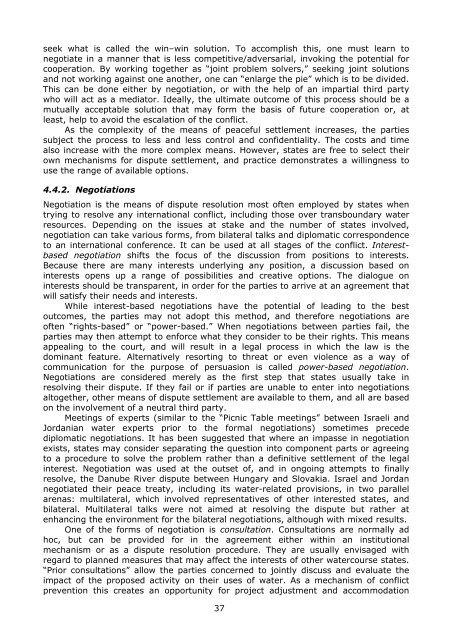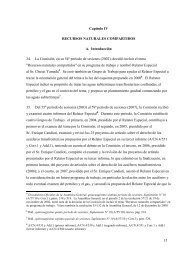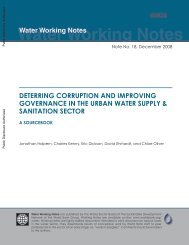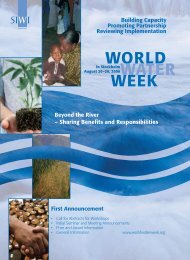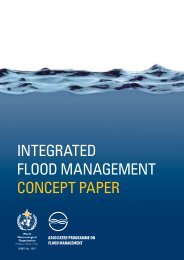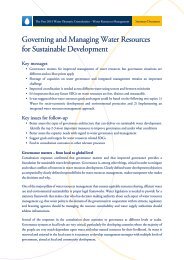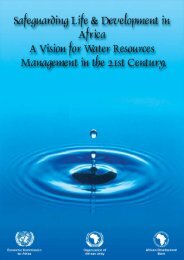Water security and peace: a synthesis of studies ... - unesdoc - Unesco
Water security and peace: a synthesis of studies ... - unesdoc - Unesco
Water security and peace: a synthesis of studies ... - unesdoc - Unesco
Create successful ePaper yourself
Turn your PDF publications into a flip-book with our unique Google optimized e-Paper software.
seek what is called the win–win solution. To accomplish this, one must learn to<br />
negotiate in a manner that is less competitive/adversarial, invoking the potential for<br />
cooperation. By working together as “joint problem solvers,” seeking joint solutions<br />
<strong>and</strong> not working against one another, one can “enlarge the pie” which is to be divided.<br />
This can be done either by negotiation, or with the help <strong>of</strong> an impartial third party<br />
who will act as a mediator. Ideally, the ultimate outcome <strong>of</strong> this process should be a<br />
mutually acceptable solution that may form the basis <strong>of</strong> future cooperation or, at<br />
least, help to avoid the escalation <strong>of</strong> the conflict.<br />
As the complexity <strong>of</strong> the means <strong>of</strong> <strong>peace</strong>ful settlement increases, the parties<br />
subject the process to less <strong>and</strong> less control <strong>and</strong> confidentiality. The costs <strong>and</strong> time<br />
also increase with the more complex means. However, states are free to select their<br />
own mechanisms for dispute settlement, <strong>and</strong> practice demonstrates a willingness to<br />
use the range <strong>of</strong> available options.<br />
4.4.2. Negotiations<br />
Negotiation is the means <strong>of</strong> dispute resolution most <strong>of</strong>ten employed by states when<br />
trying to resolve any international conflict, including those over transboundary water<br />
resources. Depending on the issues at stake <strong>and</strong> the number <strong>of</strong> states involved,<br />
negotiation can take various forms, from bilateral talks <strong>and</strong> diplomatic correspondence<br />
to an international conference. It can be used at all stages <strong>of</strong> the conflict. Interestbased<br />
negotiation shifts the focus <strong>of</strong> the discussion from positions to interests.<br />
Because there are many interests underlying any position, a discussion based on<br />
interests opens up a range <strong>of</strong> possibilities <strong>and</strong> creative options. The dialogue on<br />
interests should be transparent, in order for the parties to arrive at an agreement that<br />
will satisfy their needs <strong>and</strong> interests.<br />
While interest-based negotiations have the potential <strong>of</strong> leading to the best<br />
outcomes, the parties may not adopt this method, <strong>and</strong> therefore negotiations are<br />
<strong>of</strong>ten “rights-based” or “power-based.” When negotiations between parties fail, the<br />
parties may then attempt to enforce what they consider to be their rights. This means<br />
appealing to the court, <strong>and</strong> will result in a legal process in which the law is the<br />
dominant feature. Alternatively resorting to threat or even violence as a way <strong>of</strong><br />
communication for the purpose <strong>of</strong> persuasion is called power-based negotiation.<br />
Negotiations are considered merely as the first step that states usually take in<br />
resolving their dispute. If they fail or if parties are unable to enter into negotiations<br />
altogether, other means <strong>of</strong> dispute settlement are available to them, <strong>and</strong> all are based<br />
on the involvement <strong>of</strong> a neutral third party.<br />
Meetings <strong>of</strong> experts (similar to the “Picnic Table meetings” between Israeli <strong>and</strong><br />
Jordanian water experts prior to the formal negotiations) sometimes precede<br />
diplomatic negotiations. It has been suggested that where an impasse in negotiation<br />
exists, states may consider separating the question into component parts or agreeing<br />
to a procedure to solve the problem rather than a definitive settlement <strong>of</strong> the legal<br />
interest. Negotiation was used at the outset <strong>of</strong>, <strong>and</strong> in ongoing attempts to finally<br />
resolve, the Danube River dispute between Hungary <strong>and</strong> Slovakia. Israel <strong>and</strong> Jordan<br />
negotiated their <strong>peace</strong> treaty, including its water-related provisions, in two parallel<br />
arenas: multilateral, which involved representatives <strong>of</strong> other interested states, <strong>and</strong><br />
bilateral. Multilateral talks were not aimed at resolving the dispute but rather at<br />
enhancing the environment for the bilateral negotiations, although with mixed results.<br />
One <strong>of</strong> the forms <strong>of</strong> negotiation is consultation. Consultations are normally ad<br />
hoc, but can be provided for in the agreement either within an institutional<br />
mechanism or as a dispute resolution procedure. They are usually envisaged with<br />
regard to planned measures that may affect the interests <strong>of</strong> other watercourse states.<br />
“Prior consultations” allow the parties concerned to jointly discuss <strong>and</strong> evaluate the<br />
impact <strong>of</strong> the proposed activity on their uses <strong>of</strong> water. As a mechanism <strong>of</strong> conflict<br />
prevention this creates an opportunity for project adjustment <strong>and</strong> accommodation<br />
37


